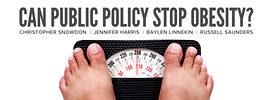In reading Christopher Snowdon’s follow-up essay about the efficacy and fairness of soda taxes in combatting obesity, I was faced with a conundrum. How to frame the state of affairs in such a way as to be mutually acceptable? Or can we even agree that there is a problem to be addressed?
In countering my own defense of soda taxes as a means of tackling the epidemic of obesity in the United States, Snowdon starts with one of my premises.
“I do dispute that obesity is a ‘public health problem,’” he writes, disagreeing with the way I described the number of Americans who are obese or overweight. Rather, it is by his lights a private health problem that affects a great many Americans. Since it is a result of individual choices, with non-transmissible consequences, then there’s really not much that should be undertaken as a public response.
On this point, I fear there’s little to be gained by arguing. He says that thinking about such problems in terms of public health is a regrettable vogue, and I say it’s an appropriate area for policy intervention, and I doubt we will convince each other. The limits of what our government ought to be doing are a subject too broad for the ambit of a conversation about soda taxes.
He also disputes that there are real costs to the public caused by obesity, because if we simply let obese people die of the sequelae of their obesity we’ll save money in the long run. (He doesn’t use that exact phraseology, but it’s certainly the crux of his argument.) Again, from a starkly mathematical point of view, I suppose he has a point. But since medical providers such as myself are in the business of keeping people alive and well as long as possible, I fear this is another area where there’s going to remain a lot of daylight in between us. Assuming that keeping people alive and in reasonable health as long as we can is something to shoot for, it would be cheaper to do so if they were less obese.
I am not as convinced as Snowdon that the Danish fat tax, which seems to have been an unmitigated failure, is a sound basis for predicting the efficacy of a more limited soda tax. The Danes applied their taxes to a wide range of what could well be considered staple foods, rather than a product (like soda) that absolutely nobody needs. Given that the role of saturated fats in developing disease and obesity is a subject of some controversy even within the medical community, the tax in Denmark seems ill-begotten on many levels. But their failure related to taxing one foodstuff does not convince me that taxing an entirely different one will meet a similar fate.
I happily concede Snowdon’s point that a soda tax will do nothing to combat the problem of sedentary behavior among the obese. Obesity is a multifactorial problem, and will require a multifactorial set of solutions, if one accepts that finding solutions should be the business of policymakers. Were Snowdon to offer alternative suggestions that addressed that factor in the country’s obesity problem, I’d gladly consider them.
Snowdon further references a slippery slope along which food regulations would slide if soda taxes were enacted. In support of this, he mentions a tobacco ad that raised the question “Today it’s cigarettes. Will high-fat foods be next?” — in 1994. Given that more than two decades have passed since those cigarette regulations were the topic at hand and now one small, solitary American city is raising taxes on soda as a means of combatting obesity, it’s a bit of a stretch to see much of a slope at all, much less a slippery one.
Further, it seems odd to complain that soda taxes won’t be effective on one hand, but then to stoke fear that they will be the start of a slippery slope on the other. Which is it? The two arguments do not cohere.
Is there potential for soda drinkers to switch to other high-calorie drinks as a substitute? Yes. I would argue that a tax on other sweetened drinks like “sports drinks” and products like Vitamin Water, which is essentially a gussied-up soda without the fizz, would mitigate this effect. I am still skeptical about beer or milkshakes as plausible soda alternatives, and even if people switch to whole milk as a possible option, it’s a much healthier one than soft drinks.
Will customers switch to cheaper soda to make up for the change in price point for the name brands? Possibly. But at least revenue will be generated that could be directed at programs to combat obesity in other areas. (I will once again suggest Head Start as a worthy candidate.)
Soda taxes have potential to be only one part of a public policy effort to combat obesity, a policy Snowdon suggests isn’t worth our time and effort in the first place. I disagree, and am curious to see what happens in Berkeley and (perhaps) beyond as this policy is given serious consideration.

